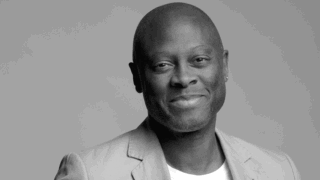The Lavin Agency Speakers Bureau
A speakers bureau that represents the best original thinkers,
writers, and doers for speaking engagements.
A speakers bureau that represents the best original thinkers,
writers, and doers for speaking engagements.
Technology is converging with our bodies, even our minds. What are the dilemmas and opportunities?
Imagine a world where employers can see into their workers’ brains. Where your thoughts can be tracked through AI. And where you can peer into your own mind to cure addictions. All of this is possible today, thanks to the merging of Artificial Intelligence and neuroscience. In the brilliant new book The Battle For Your Brain, Nita Farahany offers us a much-needed map to navigate this fast-changing technological landscape. How do we avoid the dangers of lost privacy and rights while taking advantage of the unprecedented opportunities? With the rapid advance of wearable neurotech and generative AI (think ChatGPT), we face important ethical questions about privacy, human rights, equity—and even what it means to be human. “We are at a pivotal moment in human history, in which control of our brains can be enhanced or lost,” Nita says. “We need to define contours of cognitive liberty now or risk being too late to do so.” But these technologies, Nita argues, are also an opportunity to transform how we learn, work, and live.
You’re driving home after a long day, desperate to stay awake. Suddenly, a mild zap from your headrest bolts you upright, alert. You’re safe—no caffeine required. This kind of revolutionary device is already in action, and they’re only getting more sophisticated. Nita is at the forefront of the technology and ethics of wearable AI devices that use our biological and neurological data. An internationally acclaimed thought leader who bridges law, ethics, and technology to champion ethical progress in science and technology, she says these “mind-reading” neuroscience and AI technologies will revolutionize everything. The same zap that can save a drowsy driver can also be used in the workplace to increase safety measures or tell businesses whether their customers really love what they’re looking at.
Nita leads audiences on an optimistic, but cautionary, tour through the future of AI programs, like ChatGPT, and neurotechnology. She goes over the necessary regulations and shifts that needs to be implemented with this rapidly developing technology, including how employers must build employee trust when adopting new technologies in the workplace. If we want to make the most out of AI and neurotech, transparency is vital.
Nita talks break down AI and neurotech to diverse academic, legal, corporate, and public sector audiences. Her impactful insights have reverberated on stages from TED and the World Economic Forum to the Aspen Ideas Festival and beyond. She consistently shapes public discourse and policy on neuroscience, artificial intelligence, and societal impacts through her rigorous scholarship, influential public engagements with academics, policymakers, and corporations.
President Obama appointed Nita to the Presidential Commission for the Study of Bioethical Issues, where she served for seven years. She currently serves on the National Advisory Council for the National Institute for Neurological Disease and Stroke, as an elected member of the American Law Institute and on the Global Future Council on Frontier Risks for the World Economic Forum, among others. Nita is a co-editor-in-chief of the Journal of Law and the Biosciences and is on the Board of Advisors for Scientific American. As an ethics consultant, her expertise is sought by corporations and governments worldwide. Her contributions have been recognized through election to prestigious bodies including the American Law Institute, the Uniform Laws Commission, and the AAAS.
Nita is the Robinson O. Everett Distinguished Professor of Law & Philosophy and Founding Director of the Duke Initiative for Science & Society. She is a widely published scholar on the ethics of emerging technologies, including the book The Battle for Your Brain: Defending Your Right to Think Freely in the Age of Neurotechnology. She spearheads research on futurism, law, and ethical implications of emerging technologies for society—offering a roadmap for cognitive freedom in our increasingly interconnected world.

Author of The Loop: How A.I. is Creating a World without Choices and How to Fight Back NBC News Technology Correspondent Former Editor-in-Chief of Popular Science Magazine AI Strategic Advisor to Fortune 500 Companies

Founding President, PlusCo Venture Studio Former Chief Creative and Innovation Officer, Cossette

Speaker on AI and Education Executive Director of the Stanford Accelerator for Learning

CEO and Co-Founder, Zearn Math Bestselling Author, Math Mind

Speaker on AI and Education Executive Director of the Stanford Accelerator for Learning

Harvard Business School Behavioral Science Professor "40 Under 40 MBA Professor" Author of TALK: The Science of Conversation and the Art of Being Ourselves

Author, Today Was Fun: A Book About Work (Seriously) Workplace Culture Expert Senior Advisor, SYPartners

Author, Lucky by Design Wharton Professor of Business Economics and Public Policy Forbes 30 Under 30 in Law and Policy

Harvard Business School Behavioral Science Professor "40 Under 40 MBA Professor" Author of TALK: The Science of Conversation and the Art of Being Ourselves

#1 New York Times Bestselling Author of Grit and Situated | Pioneering Researcher on Grit, Perseverance, and the Science of Success

Nobel Prize Winner | 3rd Most Cited Economist in the World | Bestselling Co-Author of Why Nations Fail and Power and Progress

Harvard Business School Behavioral Science Professor | "40 Under 40 MBA Professor" | Author of TALK: The Science of Conversation and the Art of Being Ourselves

#1 New York Times Bestselling Co-Author of Abundance | Host of thePlain English Podcast | Founder of the Substack Derek Thompson

#1 New York Times Bestselling Author of How the Word Is Passed and Above Ground | The Atlantic Staff Writer

We’re in an era where the lines between technology and the human mind are increasingly blurred. Imagine a world where your thoughts, feelings, and unspoken words become an open book, where doctors can catch disorders long before symptoms start to develop—or your boss can monitor your thoughts at work.
This intriguing premise sets the stage for Nita Farahany’s exploration of the transformative potential of brain-sensing technology and artificial intelligence. In her talk, she offers a profound glimpse into the near future, demystifying the complex advancements in AI and neurotechnology and making them accessible. A leading voice on the ethics of emerging technologies, Nita unveils the potential that these new tools have to delve into the deepest realms of human consciousness. The implications are vast and varied, ranging from revolutionizing healthcare with groundbreaking diagnostic and treatment methods, to enhancing cognitive abilities, and fundamentally altering our interaction with the digital world. She balances this optimism with a thoughtful examination of potential risks—concerns that extend beyond the hypothetical. From mental surveillance and thought manipulation to the emerging threat of cognitive warfare, Nita describes how our minds are the new battleground.
Far from a speculative glimpse into the future, this talk serves as a compelling call to action. Nita encourages the audience to take an active role in shaping a future where technological advancements are not just unrestrained progressions, but are steered towards augmenting our personal freedoms and dignity.

“Using ChatGPT isn’t cheating,” says Nita Farahany. “It isn’t unlike the seismic shifts in thinking that we’ve had when the calculator was introduced.” In a world where algorithms and digital innovations increasingly mold human cognition, understanding technology’s influence on our mental experiences is crucial. As a leading expert on neurotechnology and author of The Battle for Your Brain, Nita says that we just need to adjust how we think about thinking, and start learning how to ask the right questions.
In this talk, Nita delves into the essence of thinking freely, spotlighting human relational intelligence, mental agility, and “interoception” in the context of generative AI’s immense potential and its inherent challenges. Offering insights and examples on how to harness AI to amplify human thought and mitigate the risks posed by modern digital platforms, Nita urges a societal reimagining of how we design, employ, and regulate technology, championing the cause of human cognitive liberty.


In this captivating keynote talk, Nita Farahany delves into the fascinating world of cognitive liberty, exploring the dynamic interplay between neuroscience, neurofeedback, and cutting-edge brain-enhancing technologies. As a trailblazer in the field, Nita passionately advocates for the right to self-determination over our brains and mental experiences, emphasizing the importance of safeguarding individuals’ cognitive freedom.
From brain-to-brain communication to the use of neurofeedback, drugs, and devices, she unveils the transformative potential of cognitive enhancement, empowering the audience to harness these tools to improve attention, focus, health, and well-being. Nita sheds light on the essential rights we must champion to ensure access to these advancements while safeguarding against unauthorized intrusion into the sanctity of our minds.